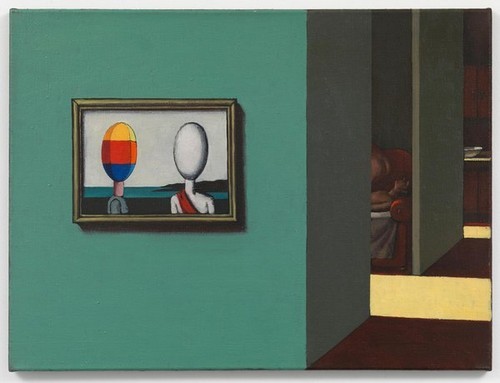Viktor Pivovarov
01 May - 05 Jun 2010
VIKTOR PIVOVAROV
"Dark Nights, Light Days"
May 1 - June 5, 2010
Opening April 30, 2010
Gallery Weekend Berlin
April 30 - May 2, 2010
www.gallery-weekend-berlin.de
Viktor Pivovarov is one of the most important artists in the history of Moscow Conceptualism. Since the 1960s he worked as a book and magazine illustrator. Together with Ilya Kabakov and Erik Bulatov, Viktor Pivovarov created a visual language of conceptual painting which became a new Soviet visual aesthetic. A pioneer of contemporary Russian Art in many respects, in 1975 he was the first to introduce the word “project” into the Russian lexicon of contemporary art (series Projects for a lonely man). Also, together with Ilya Kabakov, he created a new artistic genre - the Album - and produced many of albums during his career: Tears, Face, Conclusions (1975), Garden, Eros (1976), Kabakov and Pivovarov (1982), Characters in a play (1986) and others. Since 1982 he has lived in Prague. The most characteristic feature of Viktor Pivovarov’s art is connecting two seemingly unconnected concepts: creation of new types of diagrams of thought which are independent from the traditional aesthetic categories and at the same time a return to the classical categories of creating the painterly masterpiece. Viktor Pivovarov himself names this position as romantic. He was a student of the masters of socialist realism and even though he later rejected its teachings his work nevertheless contains elements of this tradition. In his work we can see parallels with the Russian avant-garde , surrealist traditions and even a continuation of the 19th century Russian Peredvizhniki tradition and its social criticism.
In the exhibition Dark Nights, Light Days Viktor Pivovarov contrasts paintings of the Dark Rooms series with his light drawings, in which 'Eidos' (greek 'image, shape') plays the main part. Eidos resembles a person liberated entirely from all that is human, from any sort of corporality, from any kind of gender or social marker. The figure is not presented as a physical or psychological body, not as a social or existential organism, but as an aesthetically perfect form possessing maximal potency for self-development both in an object-physical and in a spiritual sense. The form is purged of everything that is secondary, accidental, and is striving for clarity and purity. In the paintings on show the Eidos is part of the psychologically loaded scenery. This exhibition represents something like a poem with many chapters that leads the viewer into the world of autobiographical research. This is what the artist himself says about his idea behind this exhibition: "They (the characters in a play) - are the ideas, images and heroes, that are born of the artist’s imagination or by the transformation of life’s experiences into visual form, which separates itself from the creator and continue to live independently in our material world and, at the same time, in the spiritual world".
"Dark Nights, Light Days"
May 1 - June 5, 2010
Opening April 30, 2010
Gallery Weekend Berlin
April 30 - May 2, 2010
www.gallery-weekend-berlin.de
Viktor Pivovarov is one of the most important artists in the history of Moscow Conceptualism. Since the 1960s he worked as a book and magazine illustrator. Together with Ilya Kabakov and Erik Bulatov, Viktor Pivovarov created a visual language of conceptual painting which became a new Soviet visual aesthetic. A pioneer of contemporary Russian Art in many respects, in 1975 he was the first to introduce the word “project” into the Russian lexicon of contemporary art (series Projects for a lonely man). Also, together with Ilya Kabakov, he created a new artistic genre - the Album - and produced many of albums during his career: Tears, Face, Conclusions (1975), Garden, Eros (1976), Kabakov and Pivovarov (1982), Characters in a play (1986) and others. Since 1982 he has lived in Prague. The most characteristic feature of Viktor Pivovarov’s art is connecting two seemingly unconnected concepts: creation of new types of diagrams of thought which are independent from the traditional aesthetic categories and at the same time a return to the classical categories of creating the painterly masterpiece. Viktor Pivovarov himself names this position as romantic. He was a student of the masters of socialist realism and even though he later rejected its teachings his work nevertheless contains elements of this tradition. In his work we can see parallels with the Russian avant-garde , surrealist traditions and even a continuation of the 19th century Russian Peredvizhniki tradition and its social criticism.
In the exhibition Dark Nights, Light Days Viktor Pivovarov contrasts paintings of the Dark Rooms series with his light drawings, in which 'Eidos' (greek 'image, shape') plays the main part. Eidos resembles a person liberated entirely from all that is human, from any sort of corporality, from any kind of gender or social marker. The figure is not presented as a physical or psychological body, not as a social or existential organism, but as an aesthetically perfect form possessing maximal potency for self-development both in an object-physical and in a spiritual sense. The form is purged of everything that is secondary, accidental, and is striving for clarity and purity. In the paintings on show the Eidos is part of the psychologically loaded scenery. This exhibition represents something like a poem with many chapters that leads the viewer into the world of autobiographical research. This is what the artist himself says about his idea behind this exhibition: "They (the characters in a play) - are the ideas, images and heroes, that are born of the artist’s imagination or by the transformation of life’s experiences into visual form, which separates itself from the creator and continue to live independently in our material world and, at the same time, in the spiritual world".

